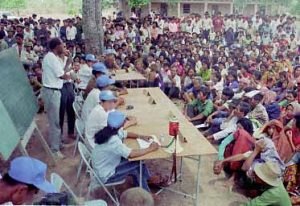Factions, UNTAC Debate Electoral Law
Factions, UNTAC Debate Electoral Law
A law setting the legal framework for next year’s general elections has been under review by the Supreme NationalCouncil (SNC) for more than three months.
While the SNC has resolved some issues-agreeing that no party may use Sihanouk’s portrait or Angkor Wat as campaign logos and outlining mechanisms for overseas Khmer to vote-members continue to debate with UNTAC whether Vietnamese people living in Cambodia should be allowed to cast ballots.
As far as UNTAC is concerned, that issue was settled last October by the signing of the Paris Peace Accords, where the Cambodian parties agreed on two criteria qualifying a person to vote: being able to show the person was born in Cambodia, or born of a parent who was born in Cambodia.
“There’s a strong push now to insert Cambodian citizenship or nationality [as a criteria for voting]-a radical modification from the Paris Accords,” said UNTAC Special Representative Yasushi Akashi. “We have to refrain from creating racial undertones to such a matter.”
Some members of the SNC say UNTAC is ignoring the reality of Cambodian history. “The Vietnamese presence in Cambodia is a problem-a cause of the war,” said SNC member Ieng Mouly, vice president of the Buddhist Liberal Democratic Party (BLDP) – formerly the Khmer People’s National Liberation Front.
“In the future we will accept multi-racial [registration],” Mouly said. “The first election is very important. We have to get our country back from foreign occupation-the Vietnamese especially -to elect a constituent assembly and build up a regime for Cambodia.”
FUNCINPEC and Khmer Rouge representatives similarly advocate the exclusion of Vietnamese residents in the election. “It’s history,” said Veng Sereyvuth, FUNCINPEC foreign affairs advisor and staff to the SNC secretariat. “We just cannot mix with these people. The Vietnamese are warmongers.”
SNC Member Khieu Samphan, president of the Democratic Kampuchea (Khmer Rouge) party, said in a June 10 statement on the electoral law: “At stake here is the issue of a ‘Cambodian’ Cambodia, and not a ‘Vietnamized’ Cambodia where foreigners were to be given the right to take part in the elections.”
Differentiating Cambodians from other ethnic groups living in Cambodia-some of whom have lived here for generations-not only injects racial criteria into voter registration, UNTAC says, but is virtually impossible to achieve. Decades of warfare have displaced many people from their original home provinces and caused the destruction of most birth records, making it difficult to verify Cambodian nationality.
Nonetheless, UNTAC Electoral Component Chief Reginald Austin is confident that mechanisms and courses of appeal have been built into the electoral process to insure that “palpably unqualified” people don’t flood the voter registration rolls, or that those who are qualified aren’t excluded.
Those lacking documentation can be registered if two other registered voters can swear the person was born in Cambodia, Austin said. Additionally, agents from the different political parties are entitled to observe any voter registration and challenge it at several points in the process.
Whether consensus is achieved on these issues or not, UNTAC will have to take steps soon to implement the electoral law, Austin said.
“The law has to move within the next few weeks if possible,” he said. “There are a whole lot of procedural processes that have to be prepared for. We have to design and print millions of forms, for example, and train the people and the parties about the law.”
The final say on the matter, Austin added, is up to Akashi.
“This is clearly spelled out in the Paris Agreement,” Austin said. “The process of consultation with the SNC is one he has chosen to go through. “But at some point-hopefully quite soon-Akashi will decide he can now legislate in whatever form he thinks is proper.”
Electoral Machine
With elections set for April or May 1993, registration must begin soon. Under the supervision of U.N. election coordinators, 4,000 Khmer nationals will work as registration officials at 800 registration points throughout the country during the three-month voter registration period slated to begin in October.

